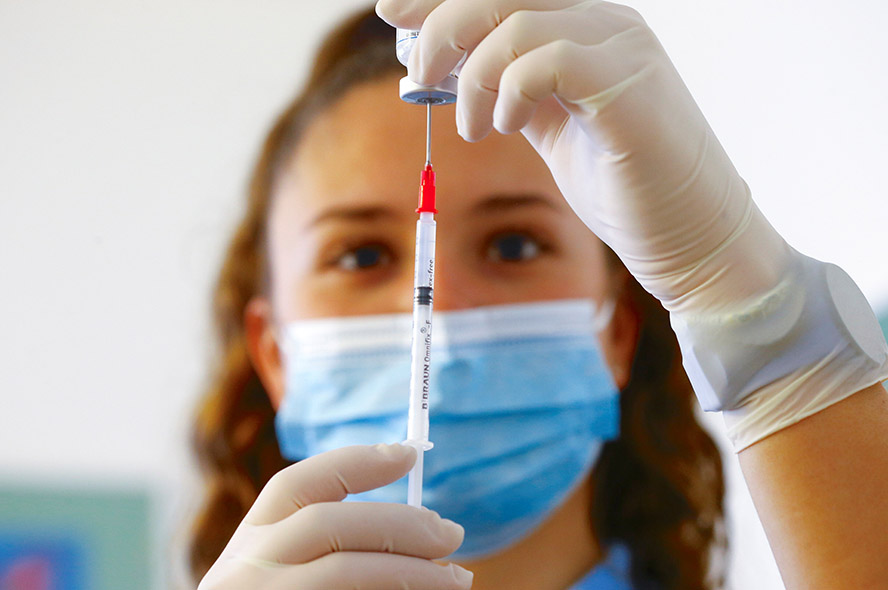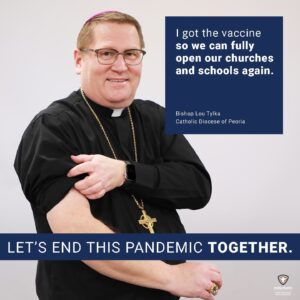Time is right to pressure pharmaceutical industry on ethical concerns: doctor

A medical assistant fills a syringe with the Moderna COVID-19 vaccine. Dr. Tim Millea, president of the St. Thomas Aquinas Guild of the Quad Cities, says the time is right to pressure the pharmaceutical industry to avoid ethical concerns in future research and produciton. (CNS/Reuters)
While the church has taught that it is morally acceptable and an “act of charity” to receive the COVID-19 vaccines, a Quad Cities physician active nationally in Catholic health care policy says now is the time to pressure the pharmaceutical industry to avoid ethical concerns in future research and production.
“This is an opportunity that God has given us to do the right thing,” said Dr. Tim Millea, presenter of a Catholic Medical Association webinar Feb. 20 on the topic “Vaccines 101: The Catholic Perspective.”
“Accepting the vaccine or accepting the use of abortion-derived cell lines (in research) are not the same thing,” said Millea. “You can accept the vaccine and still be opposed to the use of these cells.”
During the pandemic, the orthopedic surgeon — a member of St. Paul the Apostle Parish in Davenport, Iowa — has served on the vaccine task force of the United States Conference of Catholic Bishops.
Saturday morning’s webinar, open to the public, was sponsored by the St. Thomas Aquinas Guild of the Quad Cities, a Catholic Medical Association guild of which Millea is co-founder and current president.
It took place as the United States approached 500,000 deaths from COVID-19 and citizens locally and nationwide are lining up to receive vaccines produced by Pfizer and Moderna. Statements from various church leaders have clearly stated that, in light of the public health risks of the pandemic and lack of alternatives, people may in good conscience use those two vaccines, which were developed with limited use of cell lines derived from an abortion that took place decades ago.
But “we must encourage the continued development of non-morally compromised cell lines for future vaccines from all drug manufacturing companies,” the Diocese of Peoria said in a statement on Dec. 22, 2020.
“BE THE SQUEAKY WHEEL”
Millea echoed that encouragement, saying that while protests should have been more forcefully raised years ago, the current situation provides a “St. Michael moment” to defend the sanctity of all human life.
“We’ve got to be the squeaky wheel,” he told the webinar audience. Millea offered two pre-written letters that could be sent to five pharmaceutical companies taking part in Operation Warp Speed. The letters and company addresses can be obtained by writing stthomasaquinasguild@gmail.com.

Coadjutor Bishop Louis Tylka posted this image, provided by the Peoria City/County Health Department, on social media Feb. 16 after he received the first dose of the COVID-19 vaccine.
Designed separately for people who recently received the vaccine or for those expecting to receive it in the near future, the letters recognize the companies’ efforts to produce effective and safe vaccines in a rapid fashion. But they also lament that “I am one of millions of Americans who are forced to accept vaccines that are not morally nor ethically sound.”
“We look forward to benefitting from ethically produced products in the future from your company,” the letters conclude. “If you cannot meet that expectation, we will pursue products from your competitors that do.”
Noting that 70 million people in the U.S. identify as Catholic, Millea said that if 10 percent contacted the companies “could you imagine what 7 million letters would look like?”
He lauded, and urged support for, centers that are using fully ethical cell lines in research and development, including the John Paul II Medical Research Institute in Coralville, Iowa.
FROM CONFUSION TO CLARITY
Millea acknowledged that, like many Americans, he has gone through stages of skepticism and confusion regarding the development of vaccines for the pandemic, but is now at a “more confident state.”
“As I’ve gotten more involved, I’ve learned from bright, thoughtful, holy people,” he said. “I really want to be as informed as I can. We all want to leave behind a better world.” He recommended resources for further information, including the National Catholic Bioethics Center, the Charlotte Lozier Institute, Children of God for Life, and the Catholic Medical Association.
His 50-minute presentation — as well as a question period that followed — offered background on vaccine development and addressed often-voiced concerns including risks, side effects, and rumors, in addition to ethical concerns and the church’s position. Regarding the Johnson & Johnson vaccine, a one-shot alternative which was approved by the U.S. Food and Drug Administration on Feb. 27, Millea said it was less preferable than the Pfizer and Moderna vaccines from an ethical standpoint because abortion-derived cell lines were used in more stages of its development and testing.
A video of the presentation is also available by emailing Millea at stthomasaquinasguild@gmail.com.
Millea noted that the webinar “providentially” took place on the feast of Sts. Francisco and Jacinta Marto, two of the three children to whom Mary appeared several times in 1917 in Fatima, Portugal. Both were victims of the great 1918 influenza epidemic that swept through Europe that year.






